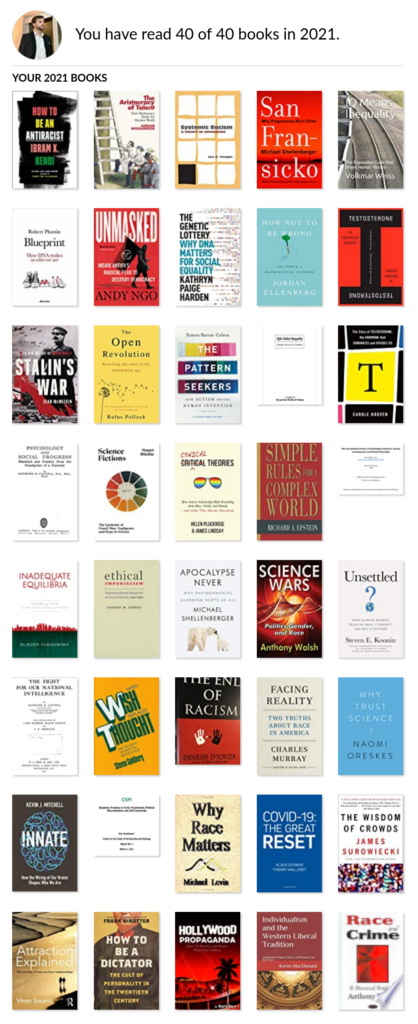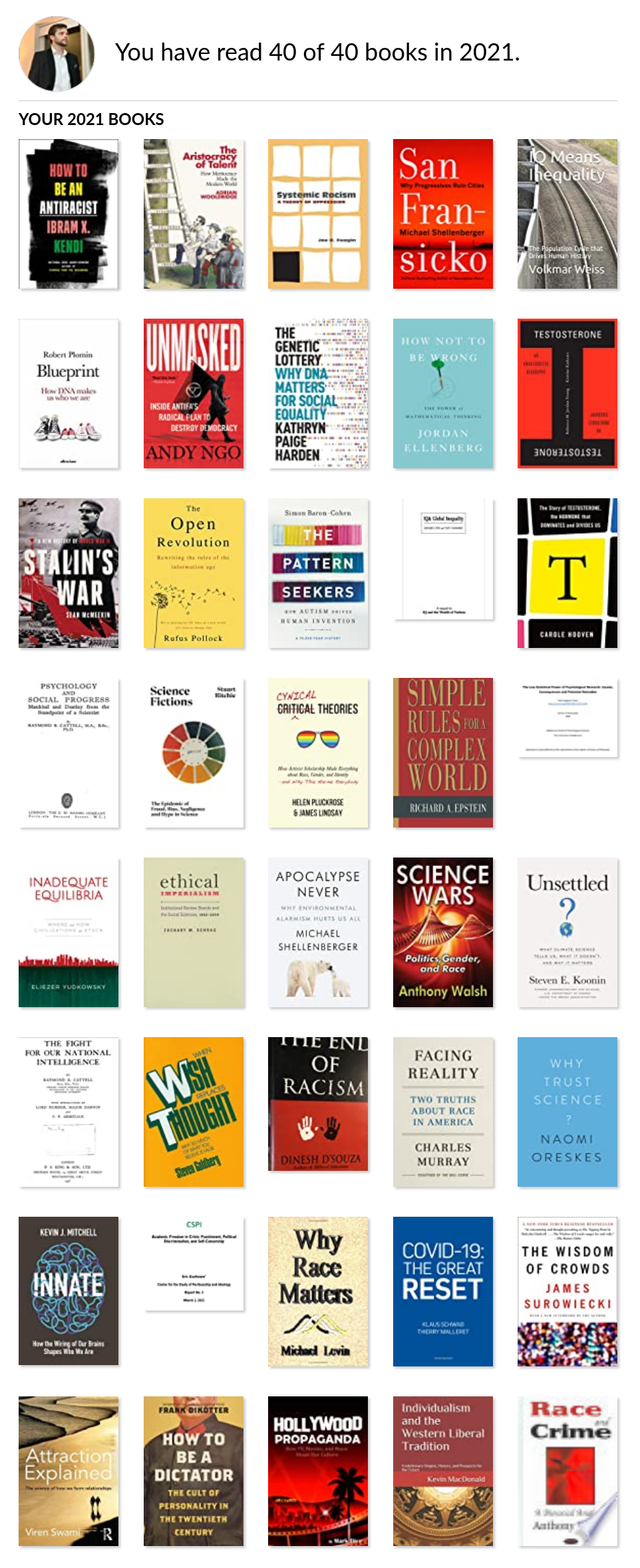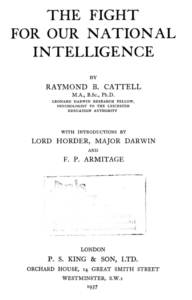Goodreads is a near-essential tool for keeping track of what you are reading and what you want to read next. Also useful for sharing your opinion about books in case someone might care about them. You can follow people whose opinions you care about, use that for deciding what book to read. Another useful feature is the near year’s resolution-like yearly reading challenge. In my case, I set it at 40. I have read more in other years, but it’s a balance between passively consuming and actively producing knowledge.
The year has just ended and so last year’s challenge, so it’s time to do a year in review. I try to read widely: some textbooks, some books on topics I haven’t read about previously, some books on my core topics (human biodiversity in all its complexity). It came out to this mix:

Some of these books I have already reviewed in longer posts:
- Kevin Mitchell’s Innate
- Raymond Cattell’s Fight for our national intelligence
- Anthony Walsh’s Science wars
- Michael Shellenberger’s Apocalypse Never, and Steven E. Koomin’s Unsettled
- Naomi Oreskes’ Why trust science?
- Klaus Schwab’s The great reset
- Kathryn Paige-Harden’s The genetic lottery
- Not a full review: Bryan Caplan and Zach Weinersmith’s Open borders
In general, I covered the books that were more substantial, or which I had more interesting things to say about. In terms of ratings, my 5 star books were:
- Unmasked: Inside Antifa’s Radical Plan to Destroy Democracy by Andy Ngo
I’ve met Andy at the Quillette meeting in Toronto in 2018. He’s certainly a courageous character. This book is a very useful summary of recent Antifa terrorist activities in the USA, and also provides some history of this movement, which also lives well in Europe. I know something about them on a personal level since in 2013, a Danish branch spuriously accused me of collaboration with Danish Neonazis. I had some threat of physical violence sent via Facebook by some pseudonym account (Kar Mus). Later Antifa actually found a friend of mine in Copenhagen and surrounded him in their brave black hoods. As it happens, he is a left-wing guy who even has a Bolivian wife. They eventually let him go without pain, but it was an uncomfortable experience!
- Stalin’s War: A New History of World War II by Sean McMeekin
This book presented a very different and engaging view on World War 2. There are people online who contest sourcing in this book (looks credible to me), so I am more skeptical now than when I finished reading it. History is a terrible field because of the extreme political bias of historians, and inability to conduct experiments or some other way acquire representative set of data or facts. I don’t know how to adjust for political bias here except to average opinions across political views. This is of course not perfect but probably better than just blindly trusting the average opinion, which is really the opinion of 90%+ left-wing historians.
This was covered in the long book review linked above.
- Psychology And Social Progress: Mankind and Destiny from the Standpoint of a Scientist by Raymond Cattell
Truly a far-ranging book! Far ahead of its time, and really deserves a fuller review. It is similar to the other Cattell book I read, just more philosophic and detailed.
- Science Fictions: The Epidemic of Fraud, Bias, Negligence and Hype in Science by Stuart Ritchie
Ritchie does not disappoint with this new book about what goes wrong with science. It is along the lines of similar books such as Bad Science and Bad Pharma by Ben Goldacre, and 7 deadly sins of psychology by Chris Chambers. There is also a review by Robert L. Williams over at OpenPsych.
Which is also covered by a long review. I really liked the data-first approach.
- The End of Racism: Finding Values in an Age of Technoaffluence by Dinesh D’Souza
Now, I know what you are thinking: isn’t this guy some Fox News Christian conservative talking head? Yes he is. That stuff is not my cup of tea, but this book is really good as a history of race in thought of the western civilization. D’Souza doesn’t really come out as a hereditarian, but he covers the main players like Jensen and Levin pretty fairly.
Really a superb study into the current crisis of academia to stick to the principles of the enlightenment and the open society.
- Why Race Matters by Michael Levin
I read favorable things about this book in the D’Souza book above, so I was curious to check it out. I had heard about it before but never thought it sounded particularly good. Well, how wrong I was! It’s very similar in spirit to the work by Neven Sesardić.
- Hollywood Propaganda: How TV, Movies, and Music Shape Our Culture by Mark Dice
This book provides a wealth of examples of the rather perverse influence of Hollywood on our culture, and even China’s culture.
- Individualism and the Western Liberal Tradition: Evolutionary Origins, History, and Prospects for the Future by Kevin MacDonald
Why is the west so individualistic? Why is the west so good compared to what IQ scores suggest? Most people know that there are only minor gaps between the IQs of East Europeans and West Europeans, yet the former are far superior in society building and science. East Asians are somewhat superior in intelligence to the West Europeans, but the latter are far superior in society building and science. Why is that? It really cries for a systematic explanation. It cannot be due to simple geographical factors as these differences are seen for settler countries too. The book is similar in spirit to the hugely popular The Weirdest People in the world by Joseph Henrich. As it happens, MacDonald actually has two additional papers about this in Mankind Quarterly, which you should also check out. The brief version is that MacDonald argues that older sources show that north and west Europeans were already individualistic and egalitarian before the catholic church instituted their anti-inbreeding laws. So rather, the catholic church instituted laws that were already widely followed for hundreds of years. The laws were caused by the tendencies not the other way around, at least, not primarily so. I think this is plausible, but just makes us wonder how this happened to begin with. I am excited to see when we can get polygenic scores to answer these questions with better confidence.
- Race and Crime by Anthony Walsh
This book by an actual criminologist provides a brief and good introduction to the topic of race and crime in the USA.


